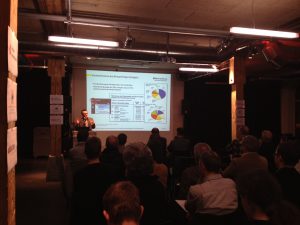Open & available, join for free! The non-commercial Internet – 17th TEWI Forum
The internet enables users to access information easily and quickly. For this, high-quality data must be available. As internet users, we are used to (free) access to a wide variety of information. News portals, online encyclopaedias, dictionaries and more are available and mediated via free search engines. Free access to data increasingly applies to the public sector as well: voting data, air pollution data or city maps are just a few examples. Such data often have an economic and socio-political benefit potential. They improve transparency, lead to cost savings and provide the basis for the development of new services. The topic of open government data was red-hot; on 28 June 2012, for example, the city of Zurich had launched Switzerland’s first portal for access to public data online.
At the 17th TEWI Forum, the audience was given an in-depth insight into the topic of free data access on the internet, with a special focus on the public sector. Experts from science and practice showed the potential and risks that freely accessible data entails.
First to speak was Prof. D. Thomas Myrach of the Institute of Information Systems at the University of Bern on “The Idea of Openness – A Classification of the Internet Phenomenon”. With the spread of internet use, new kinds of behaviour patterns and business models have emerged. Openness in access to digital resources is one of the most interesting developments because it contradicts the usual commercialisation of service offerings. What should we understand by openness? In which areas does it take place? What are the motives? In this introduction, different manifestations of openness on the internet were to be classified.
Afterwards, Dr. Matthias Stürmer from Ernst & Young discussed open government data for more transparency and participation in the public sector. The Swiss Public Access Act already stipulates that public administration information should in principle be freely accessible. However, accessing the data is time-consuming. Moreover, it is often not clear which data is available at all. Open government data solves these problems by making all non-personal and security-relevant data public right from the start. This creates more transparency and participation in the public sector and leads to more innovation and identification with the administration. The presentation gave an introduction to the topic and showed Open Data applications from Switzerland and abroad.
Furthermore, Lukas Baumgartner of the Institute of Information Systems at the University of Bern spoke about projects in federal Switzerland – the case study “LexFind”. As part of a consulting project for the Federal Strategy Unit for IT (FSUIT), the Institute of Information Systems had prepared the case study “LexFind”. This concerned project A2.08 “access to legal data” from the catalogue of prioritised projects of eGovernment Switzerland. “LexFind” illustrated an exciting area for open government data. It also became clear that such projects could not always be implemented without problems in the area of conflict between federal structures and private-sector interests.
Finally, Daniel Gemmet and Nestor Kalbermatten from the municipality of Brig-Glis rounded off the 17th TEWI Forum with a presentation on E-Brig-Glis. E-government in the broader sense means the simplification and implementation of processes for information, communication and transactions within and between state, municipal and other official institutions, as well as between these institutions and citizens or businesses, through the use of digital information and communication technologies. What does the municipality of Brig-Glis offer for services within the administration as well as for the public? This was explained in detail in an exciting presentation.


